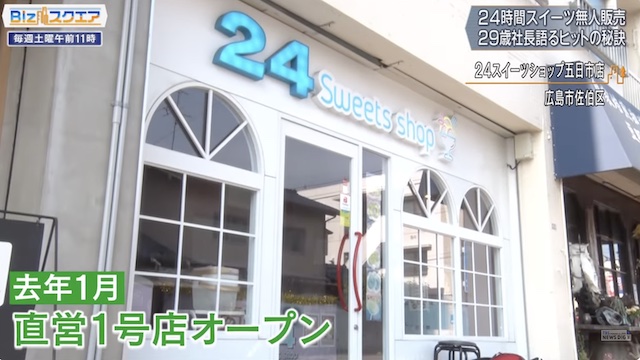TOKYO, Jun 23 (News On Japan) - The 24-hour unmanned sweets shops have gained immense popularity, expanding to 98 stores nationwide in just a year and a half. What is the secret behind their success? We spoke with the 29-year-old founder and CEO to find out.

The recently opened 24 Sweets Shop in Hiratsuka offers a variety of famous sweets from across Japan. Inside the store's frozen cases, you can find everything from shortcake from Tokushima to jarred mitarashi dango from Fukui, with prices ranging from 200 yen to over 1000 yen. Customers can purchase their desired sweets through a self-checkout system.
‘I come here often to buy sweets for myself or as gifts. It's great that the store is open 24 hours, especially for late-night cravings,’ said a customer. ‘The items here are really photogenic too.’
Shoya Kubota, the 29-year-old CEO, founded the first store in his hometown of Hiroshima in January last year. Since then, the chain has rapidly expanded to 98 stores, with sales increasing ninefold compared to a year ago.
Kubota's approach focuses on creating an inviting atmosphere that appeals to social media users. 'We incorporate elements like neon lights to create a space that people want to share on social media,’ he explained.
Before venturing into unmanned sweets shops, Kubota ran construction and security companies. The idea for 24-hour unmanned sales came from his company officer's mother, who often bought sweets online but faced issues with high prices and limited availability. Kubota saw a business opportunity in offering a wide selection of sweets available 24/7.
‘The response to our first store was overwhelming, with over 200 customers on the first day alone,’ Kubota recalled. He also emphasized the benefits of an unmanned business model, which reduces labor costs and operational expenses.
The 24 Sweets Shop differentiates itself by offering a constantly changing selection of over 40 to 50 types of sweets at any given time. ‘Initially, it was challenging to source products as suppliers were hesitant. But now, thanks to media coverage, suppliers are approaching us,’ Kubota said.
Currently, the company collaborates with about 80 suppliers, offering around 700 to 800 products. Kubota plans to release 200 new products annually to keep the offerings fresh and exciting.
Kubota's goal is to expand to 500 stores within five years. He believes that constant product rotation is crucial for sustaining customer interest. ‘We plan to source products not only from Japan but also from places like South Korea, which is known for innovative trends,’ he added.
The shops' higher-priced sweets, compared to convenience store offerings, cater to customers seeking unique and Instagram-worthy items. Kubota envisions his stores as places people visit for special occasions rather than everyday purchases.
The unmanned model has also attracted franchisees, with some stores generating impressive sales, such as 20 million yen in the first month. Franchise owners, like the CEO of a machinery manufacturing company in Aichi Prefecture, appreciate the business model's low labor requirements.
‘The key to success is the location. Stores in suburban areas with parking facilities perform better than those in city centers,’ noted a franchise owner.
As the business grows, Kubota remains focused on his core strategy: maintaining a dynamic and appealing product lineup. ‘We want customers to always find something new and exciting when they visit our stores,’ he said.
Kubota's dedication to innovation and customer engagement is driving the rapid expansion of 24 Sweets Shops across Japan.
Source: TBS















